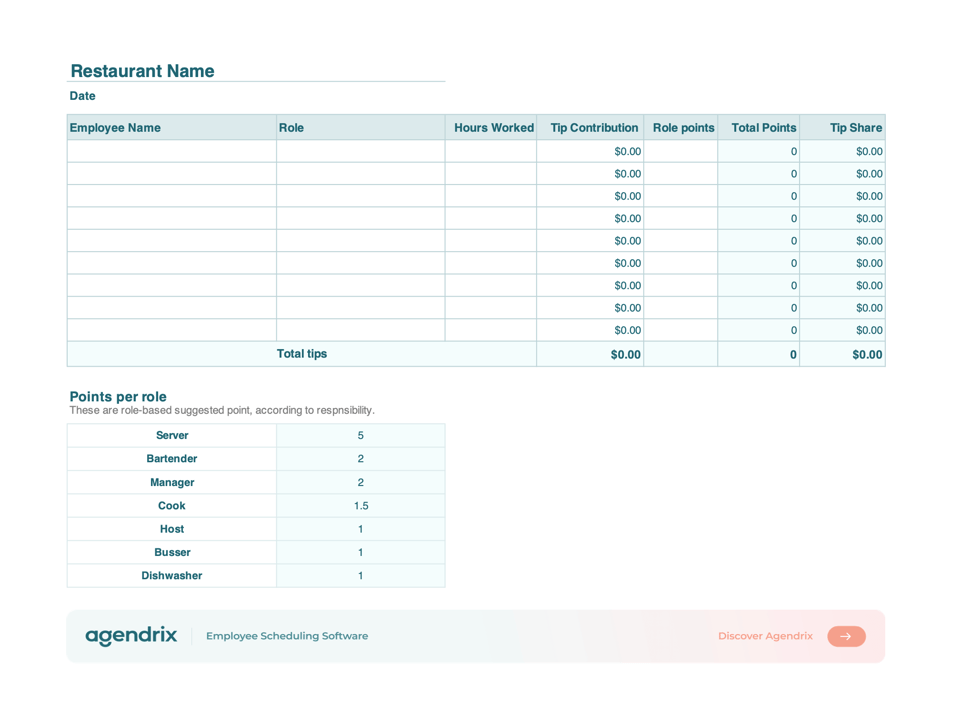Restaurant Tip Pool Calculator
A tip pooling calculator helps managers and staff split tips fairly by hours worked, role, or percentage. This Excel-based tip pooling calculator includes space for employee names, roles (FOH/BOH), hours, and total tips. It’s an efficient and transparent way to manage pooled tips and avoid disputes.

To which address should we send your resource?
What is a restaurant tip pooling calculator?
A tip pooling calculator is a tool that helps restaurants distribute collected tips among staff based on predefined rules such as hours worked, position, or percentage shares. It ensures fair, documented tip distribution among all teams.
How do you calculate tip pooling?
Define the eligible pool (who participates and which payments count), choose a split method (hours, sales, or points).
Keep service charges separate and follow local tip laws.
- Set eligibility: roles that may join (e.g., servers, bartenders, bussers) and any exclusions (managers if they have hiring/firing power).
- Define the pool: cash tips + card tips + auto-gratuities you classify as tips; track service charges separately.
- Pick a split method:
- Hours-based for fairness when sales vary by section.
- Sales-based when sections are comparable.
- Points/weights to recognize role intensity (e.g., server=1.0, bartender=1.2, busser=0.6).
- Calculate the allocation: apply the chosen formula to each eligible employee.
- Apply guardrails: round rules (e.g., to nearest $0.25), tip-out minimums/maximums, and audit logs.
- Communicate & document: post the policy; show nightly worksheets; obtain acknowledgments.
- Stay compliant: confirm local rules on tip pooling, tip credits, credit-card fee deductions, and manager/supervisor participation.
Compliance note: Tip laws vary by location; verify your policy with current local regulations before implementation.
To keep payouts aligned with wages and sales, use our restaurant labor cost calculator.
Plan labor ahead with a restaurant staffing budget template to avoid over- or under-pooling.
What is the fairest way to split tips?
Use a transparent, role-weighted points system with clear eligibility, documented rules, and nightly audit logs. Allocate tips by hours × role weight (e.g., server = 1.0, bartender = 1.2, busser = 0.6), then divide the pool proportionally. Review weights quarterly and comply with local tip laws.
Fairness controls: eligibility rules, rounding (e.g., $0.25), caps/floors, credit-card fee policy, and written acknowledgments.
Compliance note: Tip pooling, service charges, manager/supervisor participation, and tip-credit rules vary by location. Confirm local law before adopting any method.
Track actual hours with a restaurant timesheet template (Excel) for nightly reconciliation.
Is tip pooling legal?
Yes, in many places, if specific rules are followed. Most jurisdictions allow tip pooling among tipped, non-managerial employees with clear written policies, accurate recordkeeping, and compliance with local rules on tip credits, credit-card fee deductions, and whether supervisors/managers may share (often prohibited). Align FOH/BOH shifts using a restaurant work schedule template so tip pools reflect staffing. Always check your state/provincial law.
- Who can share: Typically tipped, non-managerial staff; supervisors/managers with hiring/firing power are usually excluded.
- What counts as tips: Voluntary customer gratuities (cash or card). Service charges are usually not tips and follow different rules.
- Deductions: Some places allow passing credit-card processing fees on tips (often capped); others do not.
- Minimum wage & tip credits: Where tip credits exist, employers must meet all conditions (notice, make-up to minimum wage, etc.).
- Policy & transparency: Put the pool formula, eligibility, and rounding in writing; keep nightly audit logs.
- Local variations: Rules differ by country/state/province; consult current local regulations or counsel.
How does a tip pooling calculator work?
You enter employee names, roles, hours worked, and total tips for the shift or week. The tip pooling calculator then divides the tips according to the method you choose—equally, by role weight, or by total hours worked.
Why Should Restaurants Use a Tip Pooling Calculator?
Using a restaurant tip pooling calculator promotes transparency, reduces conflict, and ensures compliance with labor laws and internal policies. It’s especially helpful in high-volume environments with rotating teams. Managers tend to use them, among other popular free restaurant management templates, to streamline operations





